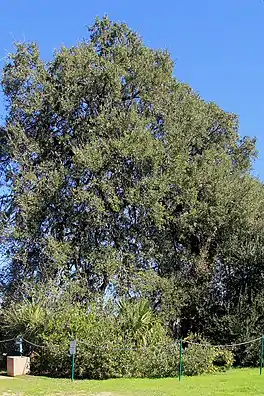Treaty Oak (Austin, Texas)
The Treaty Oak is a Texas live oak tree in Austin, Texas, United States, and the last surviving member of the Council Oaks, a grove of 14 trees that served as a sacred meeting place for Comanche and Tonkawa tribes before European colonization of the area. Foresters estimate the Treaty Oak to be about 500 years old. Before its vandalism in 1989, the tree's branches had a spread of 127 feet (39 m). The tree is located in Treaty Oak Park, on Baylor Street between 5th and 6th Streets, in Austin's West Line Historic District.
| Treaty Oak | |
|---|---|
 The Treaty Oak in 2015 | |
| Species | Texas live oak (Quercus fusiformis) |
| Location | West Line Historic District (Austin, Texas) |
| Coordinates | 30.27130°N 97.75550°W |
History and legends
Legends
A Native American legend holds that Council Oaks was a location for launching war and peace parties. Legends also describe that Hasinai women would drink a tea made from honey and the acorns of the oaks to ensure the safety of warriors in battle.[2]
According to popular local folklore, as well as the inscription on the plaque at the tree's base, in the 1830s, early Texas pioneer Stephen F. Austin met local Native Americans in the grove to negotiate and sign Texas's first boundary treaty after two children and a local judge were killed in raids. No historical documentation exists to support this event taking place. Folklore also holds that Sam Houston rested beneath the Treaty Oak after being deposed as Governor of Texas by the secessionist state legislature at the start of Texas's involvement in the American Civil War.[1]
History
As more and more European-Americans colonized Texas, Council Oaks fell victim to neglect and the development of Austin. By 1927 only one of the original 14 trees remained. The American Forestry Association proclaimed the tree a perfect specimen of a North American tree and inducted the Treaty Oak into its Hall of Fame.
Beginning in the 1880s, the tree was privately owned by the Caldwell family in Austin. Because she could no longer afford to pay property taxes on the land, in 1926, the widow of W.H. Caldwell offered the land for sale for $7,000. While local historical groups urged the Texas Legislature to buy the land, it appropriated no funds. In 1937, the City of Austin purchased the land for $1,000 and installed a plaque honoring the tree's role in the history of Texas.
Vandalism
In 1989, in a deliberate act of vandalism, the tree was poisoned with the powerful hardwood herbicide Velpar. Lab tests showed the quantity of herbicide used would have been sufficient to kill 100 trees. The incident sparked community outrage, national news reports, and a torrent of homemade "Get Well" cards from children that were displayed on the fence around the park. Texas industrialist Ross Perot wrote a blank check to fund efforts to save the tree. DuPont, the herbicide manufacturer, established a $10,000 reward to capture the poisoner. The vandal, Paul Cullen, was apprehended after reportedly bragging about poisoning the tree to cast a spell. Cullen was convicted of felony criminal mischief and sentenced to serve nine years in prison.
The intensive effort to save the Treaty Oak included applying sugar to the root zone, replacing soil around its roots, and installing a system to mist the tree with spring water. Although arborists expected the tree to die, the Treaty Oak survived. Still, almost two-thirds of the tree died, and more than half of its crown was pruned.[1]
Today
In 1997, the Treaty Oak produced its first crop of acorns since the vandalism. City workers gathered and germinated the acorns, distributing the seedlings throughout Texas and other states. Today, the tree is a thriving, although lopsided, reminder of its once-grand form. Many Texans see the Treaty Oak as a symbol of strength and endurance. In January 2009, the Texas chapter of the International Society of Arboriculture partnered with the Austin Parks and Recreation Department to do maintenance pruning of the Treaty Oak.
See also
References
- Phoebe Judge (February 5, 2016). "Perfect Specimen". thisiscriminal (Podcast). PRX. Retrieved October 28, 2018.
- ^ "Treaty Oak". Famous Trees of Texas. Texas A&M University. Retrieved February 15, 2018.
- ^ Mary A. Steinhardt. "The Story of Treaty Oak". Archived from the original on July 17, 2012. Retrieved February 15, 2018.
- ^ "Treaty Oak History". Austin Parks and Recreation. City of Austin. Archived from the original on February 4, 2012. Retrieved February 15, 2018.
- ^ Erica, Riggins (November 16, 2004). "Writing Austin's Lives: Saving Treaty Oak". News 8 Austin. Archived from the original on December 28, 2005. Retrieved February 15, 2018.
- ^ "A Thousand Trees for Texas". Archived from the original on May 12, 2011. Retrieved February 15, 2018.
External links
- Treaty Oak from the Handbook of Texas Online
- Treaty Oak from About.com
- The Treaty Oak in Austin, Texas